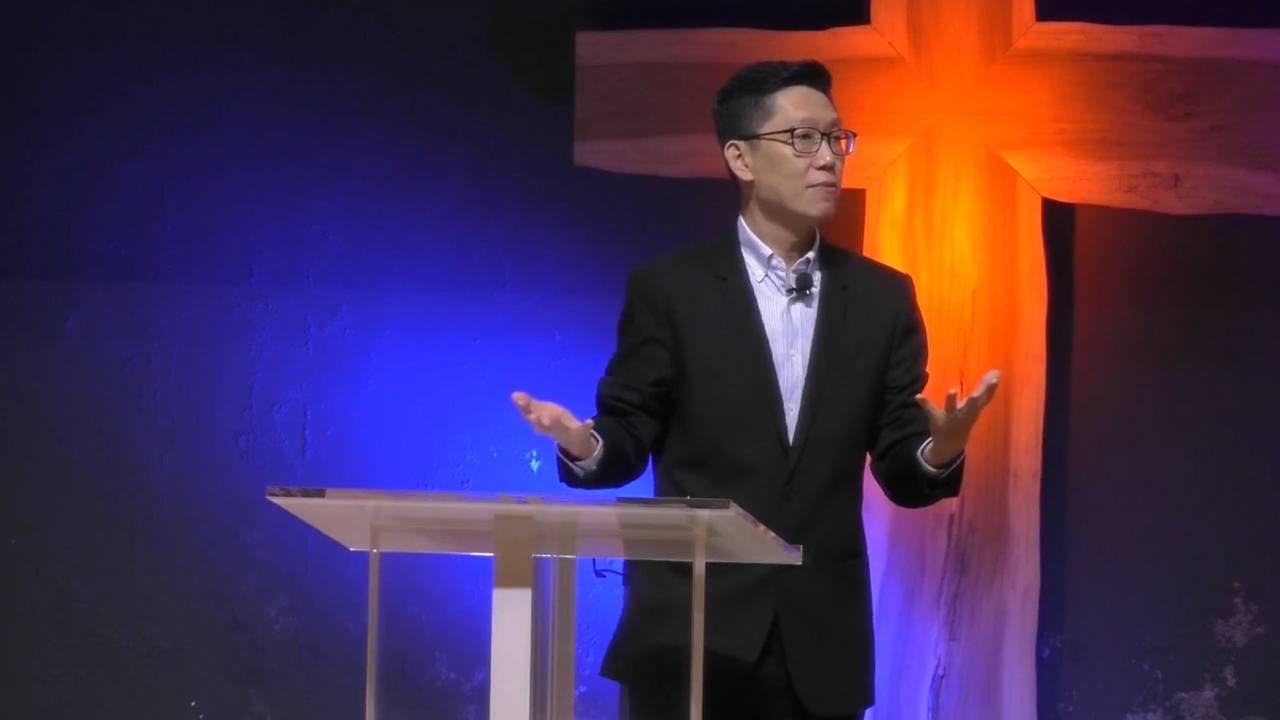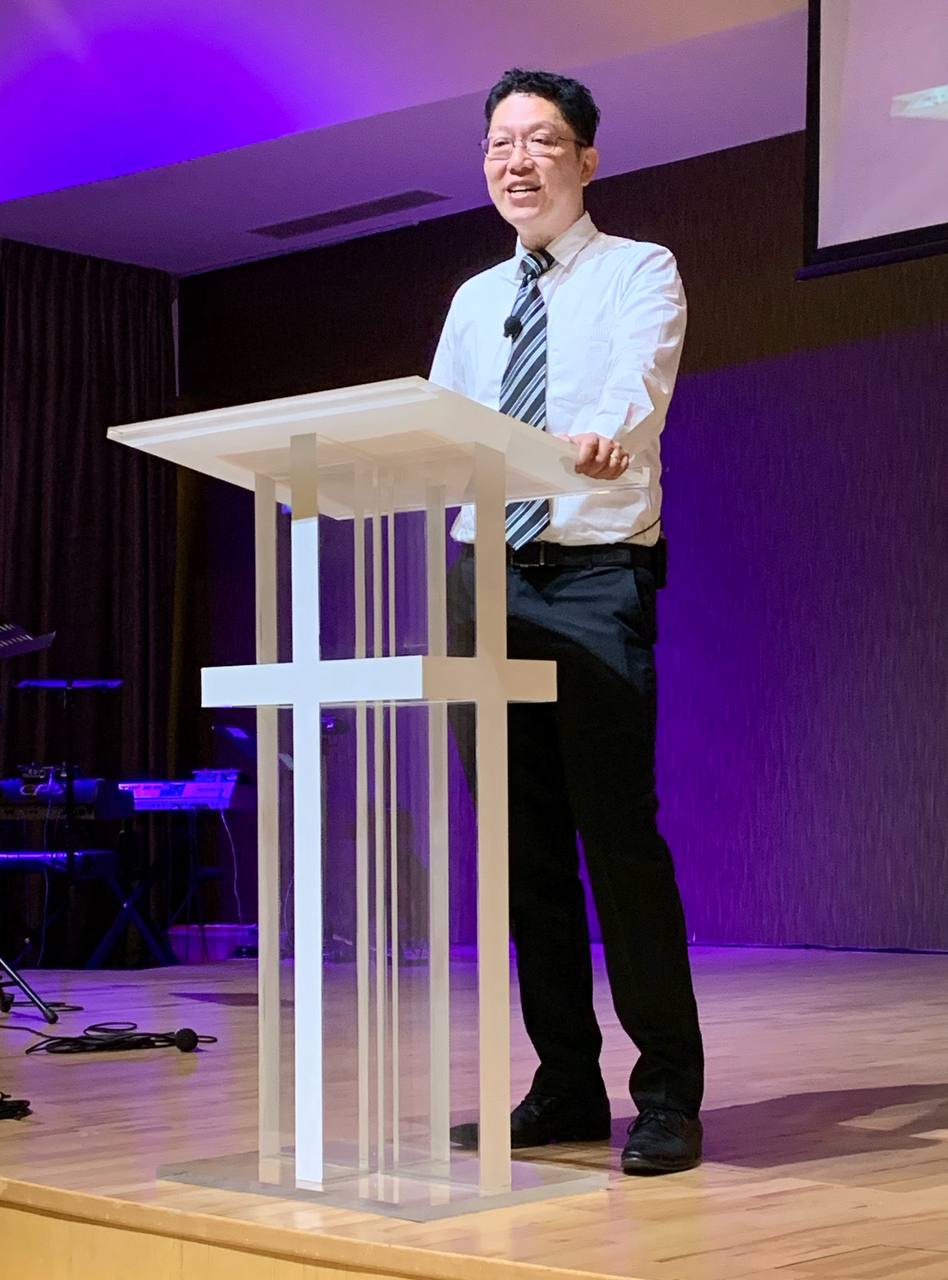“I asked my wife to give me permission to end my life”: One pastor’s battle to come out of anxiety and depression
TRIGGER WARNING: This story contains mention of suicide ideation.
by Christine Leow // August 16, 2022, 12:37 pm

Once full of mirth and an active sportsmen, Ps Vernon Song became anxious and depressed because of a crisis at work. But God use that season to transform him and give him a heart for the hurting. All photos courtesy of Pastor Vernon Song.
He had gone to a shopping centre to buy some sportswear. An avid sportsman who ran three times a week, cycled weekly and competed in duathlons, Pastor Vernon Song had always led an active life.
But that day, the moment he stepped into the sports shop, he became immobilised.
“I hugged my bag to my chest to prevent it from exploding.”
“I felt like my chest was going to explode. It was physically unbearable and overwhelming. I found the nearest seat and I hugged my bag to my chest to prevent my chest from exploding.”
The feeling lasted for an excruciating length of time and was so bad that Ps Vernon, 54, thought of checking himself into the nearest hospital. But he could not move from the spot.
Then, he remembered he had some anti-anxiety pills that his GP had prescribed him the day before. The public bathroom was just a few steps away. Yet to walk there to get water for the pills seemed impossible.
“In the end, I forced myself to walk to the toilet to get some water to take my medication and to walk back to my seat.

Ps Vernon used to compete in duathlons. Now that he is recovering from anxiety and clinical depression, he has returned to running and cycling.
“After that, the feeling subsided. I didn’t know it then, but that was my first panic attack.”
The panic abated but the anxiety remained with Ps Vernon for the rest of the day. That would be the start of his four-year spiral down a dark and frightening tunnel as he battled anxiety that led to clinical depression.
A church in crisis
Ps Vernon started his full-time ministry as a youth pastor at his church in 2007.
The next year, he was put in charge of the children’s ministry. It was a perfect fit for the man who describes himself as the “clown of the family” who could always make his two children, a daughter and a son, laugh.

Ps Vernon was once a primary school relief teacher for a year. It was then that he found he could connect with children, a discovery that prepared him to helm the children’s ministry in his church.
He had also worked as a relief teacher in primary school for a season.
“I enjoyed it tremendously. I realised I was able to engage kids and I enjoyed interacting with kids.”
About five years in, the church experienced a crisis. There were long-drawn mediations to resolve the situation and heal the hurts. This went on for a few years.
“I had no one to talk to.”
“On the one hand, I was upset, angry and bitter.
“But I was feeling very helpless and hopeless because the medication didn’t appear to be helping.
“I thought, God, where are you?”
Ps Vernon had few people he could talk to about what he was going through. His colleagues were in the same situation and, in order to keep the confidentiality, he could not even share with his wife.
“I had no one to talk to. I was crying many times over this during this period of time.”
Heavy heart
It would be December 2014 before everything was resolved. But the end of the church crisis became the beginning of a personal one for Ps Vernon.
“I remember telling a colleague, ‘I know all this has been resolved and I should be relieved but I don’t know why I feel so heavy in my heart.”
He battled feelings of helplessness and hopelessness.
“I never cried that much before. There was a sense of anger, bitterness. I felt very alone. It was emotionally draining. I had never felt like that before.”

Not only does Ps Vernon teach at the children’s ministry and lead worship, he also preaches at worship service.
By February the next year, Ps Vernon decided to get help. He went to a GP.
“I told the doctor, ‘I don’t know why I’m here. But you read articles that tell you that when you are not well, go see a doctor. That’s why I am here.’”
The GP suspected that he might be suffering from depression and prescribed medication for that and for anxiety. He also referred Ps Vernon to a psychiatrist.
“It was emotionally draining … and scary in its unpredictability. Because of that, I didn’t want to go out.”
The next day at the shopping centre, though he did not know it, nor did he understand what he was feeling, Ps Vernon experienced the first of what would be several anxiety attacks.
“Imagine being afraid of heights. Then take that feeling and multiply it by 20, 30 times. I felt like that 24/7.
“I would be sleeping and when I woke up in the morning, it would feel like that.”
Unbidden and without any identifiable triggers, Ps Vernon would be seized by panic attacks as he went about his life – while doing groceries, before he shared devotions at his church kindergarten.
“It was scary in its unpredictability. Because of that, I didn’t want to go out.”
The psychiatrist would later confirm what the GP had thought. Ps Vernon was diagnosed with anxiety and clinical depression. He told his wife. Neither knew much about mental illness. They certainly did not expect that the road ahead would be so difficult.
Walking zombie
The medication that was supposed to help him with depression made him feel like he was living in a bubble, simply existing.
“I couldn’t cry. I couldn’t feel. Everything was: What’s the point? Hopelessness, helplessness.”
“I didn’t feel like myself. You could tell me that I had won a billion dollars and I would have told you, ‘Great.’ But it would have been just a fact to me. I wouldn’t have been able to sense joy or excitement. Everything was muted.”
His anti-anxiety medication made him feel as if everything had slowed down and he was tired and sleepy all the time.
“You feel like a walking zombie because you can’t connect with the world emotionally. You only connect cognitively.”
By this time, the bouts of crying had been replaced by emotional numbness.
He did not really want to die. He simply did not want to live in pain.
“When you say depression, you are not sad. I couldn’t cry. I couldn’t feel. Everything was: What’s the point? Hopelessness, helplessness.”
In an effort to find some hope, Ps Vernon researched his condition.
“I wanted to know when all this would end. There were not many success stories – 10 years, 15 years. I couldn’t live like that.”
That was when the suicide ideation came. He did not really want to die. He simply did not want to live in pain.
“I couldn’t imagine living like that. Won’t it be easier just to end my life?”
Living with mental illness
He had been a man who had preached sermons and sat in the front of the sanctuary during worship service. Now, going to church became unbearable. Ps Vernon stopped going for fear that his anxiety attacks would overcome him.
At work, he would lie down under his desk and fall asleep in the darkened room from the effects of the medication. He experienced brain fog and could not remember anything. His hands would tremble as well.
“I was asked to sign the baptism certificate of members. In 10 instances out of 10, my signature looked different.”
Once “full of nonsense” with his children, now he could only lie on the couch or in bed.
His colleagues rallied around him, taking on some of his responsibilities. While Ps Vernon appreciated their kindness, he also feared for his job.
“I would surf the Internet to find out more about depression and there would be these articles about people losing their jobs when they had depression.
“I was worried. I thought that was going to happen to me. I was very fearful. So, I looked for possible jobs. But who was going to hire me with such a condition?
“That did not help my anxiety at all, even though there was no mention in my church that they were going to fire me. But when you are in this situation, you think of the worst.”
At home, Ps Vernon became a shell of the man he used to be. Once “full of nonsense” with his children, now he could only lie on the couch or in bed. His wife, Yoko, worked and managed the children and the household to give him as much space as possible to heal.

Ps Vernon with his daughter Ashley, wife Yoko and son Brandon.
“My wife is a strong woman. But I don’t think she knew how to help me because this was something new to her. She said she lost me during those initial years.”
“I felt like Saul, like God had left me.”
Even though she did not like dogs, Yoko relented and let Ps Vernon have one because he had read that dogs were therapeutic for those who were depressed.
Through it all, Ps Vernon did not blame God. He could not, because he could not even sense the presence of God.
“In the past during worship, I could sense Him. Tears would run down my face.
“During depression, I still knew He exists and He is what He says in the Bible. But I couldn’t connect with Him. I would read God’s Word when I was able to, but it didn’t mean anything. It was mere words to me.
“It was scary. That was the reason why I felt like Saul, like God had left me. I told God time and time again, ‘I am not denying You.’”
Not alone
When the Internet failed to yield information that could give him hope, Ps Vernon sought out fellow pastors who had experienced depression.
“It helped to know that there are pastors out there who are struggling as well. I felt I was not so alone.”
Pastors are particularly vulnerable to mental health issues because of the high expectations others have of them, said Ps Vernon.
“Some people think and expect pastors to have all the answers and to be experts in everything. But we are not and it can be very stressful.
The desire to not “stumble people” can prevent pastors from sharing their struggles openly.
“In addition to caring for our church and its members, pastors have families, too. And some of us may go home to financial, children and even marital issues. What about those of us who may have elderly parents to take care of?”
The desire to not “stumble people” can prevent pastors from sharing their struggles openly.
“Who do you turn to? Where is the help? So, I guess many times we pretend that we have it all together.”
This was why Ps Vernon found his sessions with his psychologist helpful. He finally found someone to whom he could confide and who could help him understand himself better.
“My counsellors took me back to my childhood, my make-up, how I was treated as a child. At first, I was upset with my counsellor. Why involve my parents and childhood?

Ps Vernon attended church in his youth but only became serious about his faith during his university days in the US. In dealing with his anxiety and depression, his counsellors asked him to talk about his childhood and past.
“Now, I understand there may be issues I never knew existed in my past that I brought with me to my adulthood that might have contributed to me falling into depression.
An unexpected healing
Despite all this, Ps Vernon still saw little improvement for over three years. The turning point came on National Day of 2018. His anxiety was so bad that, even with medication, he found himself squatting in pain in the kitchen.
His wife was there and he asked her: “Yoko, would you give me permission to end my life?”
“No,” she replied.

Ps Vernon was in so much pain during his depression that he once asked his wife, Yoko, for permission to end his life.
Overwhelmed, he texted his psychiatrist despite the fact that it was a public holiday and begged to be allowed to take a higher dose of his medication. When the holiday was over, he returned to his psychiatrist and was given a stronger medication and told to return in two weeks.
“Surprisingly two weeks after that experience, my anxiety stopped miraculously.
“From that day onwards, I would wake up and I never felt any anxiety. It has to be a God thing. How do you explain it? I have been having medication all these years.
“And although I was given stronger anti-anxiety medications for two weeks, how could this stronger medication help to, not just to give relieve to my anxiety, but to end my anxiety totally?”
He found himself crying during worship and knew that God had started to heal him spiritually.
When the anxiety lifted, the depression was also alleviated.
In 2019, Ps Vernon stopped taking his medication entirely.
During Pastors’ Prayer Summit 2019, he found himself crying during worship and knew that God had started to heal him spiritually.
“I could sense God’s presence again. I was in touch with God again.”
Even though journeying with God throughout the years when he felt numb had been extremely difficult, Ps Vernon had a word of encouragement for all those struggling: “Don’t wait till the depression passes to seek God. He is eager to walk with you in the midst of it.
“I tell people that suffering with mental health issues is like suffering from cancer. You can go through remission. But all it takes is for the right trigger to bring it all back.
“And this is why it is important to speak to a counsellor. So, when I am feeling stressed now, I will slow down.”
Helping others on the journey
As for his question to God as to why He had allowed all this to happen, Ps Vernon said that he believed that “God is a God of purpose”.
“There is no face to depression. I could be smiling and still be in depression.”
“Although He did not reveal the answer to me, I am beginning to see glimpses of possible reasons why He has allowed this to happen to me.
“Instead of being the old Vernon, I have grown during my journey. I now have better self-awareness. And I have discovered the rhythm of life that has helped me in my ministry and personal life.
“Believe it or not, I have even received feedback that I now preach better than before I went into depression. Is it worth it? I don’t wish for anyone to go through this. But I think it was a good thing for me if this is the result.”

Now, Ps Vernon shares freely his journey with anxiety and depression in the hope of encouraging others.
Ps Vernon’s experience has also given him a deep conviction to speak up about mental illness.
“God spoke to me through the Parable of the Talents. He said, ‘This has been a few years of experience, struggles and stories in your life. Are you going to shut up or make it count for the Kingdom of God?’
“Live one day at a time. And at the end of each day, celebrate!”
“So, as a pastor, I chose to speak openly about my struggle with mental health and I hope that through these stories, people who are struggling with it can have the courage to seek help, to be encouraged that healing can take place, and to know that they are not alone in this.
“If I can encourage just one person to come out and seek help and find healing, I am happy.”
The other reason Ps Vernon shares freely about his experience is because of his desire to dispel misconceptions about mental illness.
“Some people have told me, ‘Vernon, you don’t look like you have depression.’ How does one look like when one is depressed? There is no face to depression. I could be smiling and still be in depression.”

Ps Vernon wants to debunk the myth that those depressed are always sad. Depression for him resulted in not having feelings at all.
The idea that people with mental illness are crazy is another misconception. Ps Vernon feels that misconceptions and stigma can only be removed when people are given time to learn and understand about mental health.
“For those who ask, ‘How long before I can feel better?’ I say to them, ‘Don’t ask these questions. Live one day at a time. And at the end of each day, celebrate!’”
Where to find support for those with mental health issues
For immediate assistance call these 24-hour hotlines:
- National Care Hotline: 1800-202-6868
- Institute of Mental Health Emergency Hotline: 6389 2222
- Samaritans of Singapore 1800-221-4444
Christian Mental Health Advocates (CMHA) was set up by a pastor together with a psychiatrist and senior consultant at a government hospital, with the goal of bringing the church and allied health professionals together.
They now have about 40 professional partners as a pool of resources to tap on. They hope to better equip churches to deal with mental health issues through talks and training for church members and leaders, according to the needs of each church.
They are also looking to hold a national conference for pastors on mental health issues next year, and are looking to develop support groups. In particular, for pastors who struggle to share their mental health issues with others as they fear being judged. Those who are interested can e-mail Pastor Chua Seng Lee.
Mental Connect is a one-stop portal to help people find care, support and events in various categories from counselling and therapy to employment reintegration and day rehabilitation. It also lists Christian psychiatrists, psychologist and counsellors. For more information, click here.
PSALT Care has two support groups for individuals who have sought treatment for issues related to anxiety, depression and bipolar disorders. One is the Christian-based Peer Support Group. Click here for more information.
Call 999 if there is a risk of injury, immediate threat to life or bodily harm (relatives and friends of victims can call as well).
RELATED STORIES:
How a woman’s struggle with schizophrenia resulted in a medical care portal for the mentally ill
Burnt out so many times he lost count, now he helps others build mental resilience
We are an independent, non-profit organisation that relies on the generosity of our readers, such as yourself, to continue serving the kingdom. Every dollar donated goes directly back into our editorial coverage.
Would you consider partnering with us in our kingdom work by supporting us financially, either as a one-off donation, or a recurring pledge?
Support Salt&Light



